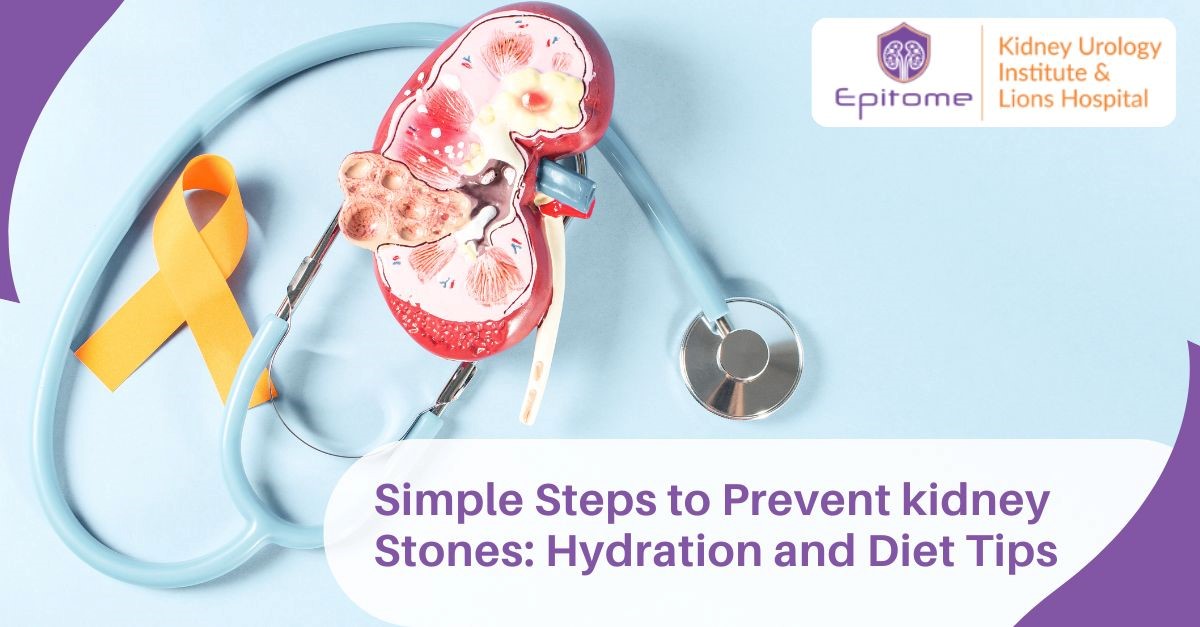The prevalence of kidney stones in India has seen a dramatic rise over the decades. In the 1960s, the incidence was below 40 per 100,000 people, but recent data show it has increased to approximately 930 per 100,000 inhabitants. Community-based studies report a lifetime prevalence of urinary stones at 7.9% in northern India, with most cases diagnosed between ages 20 and 40.
Fortunately, understanding how to prevent kidney stones involves straightforward lifestyle changes centered around proper hydration and diet modifications. People who produce 2 to 2.5 liters of urine daily are 50% less likely to develop stones than those who produce less. A kidney stones diet should emphasize foods that prevent kidney stones while limiting sodium intake to under 2,300 milligrams daily. If you’re prone to recurrent stones, it’s wise to consult a Kidney Stones Specialist in Delhi for a tailored prevention plan.
1. Stay Hydrated to Dilute Stone-Forming Crystals
Proper hydration stands as the cornerstone of kidney stone prevention. When you drink insufficient fluids, your urine becomes concentrated, allowing minerals to crystallize and form stones.
Daily water intake recommendations
The consensus among medical experts is clear – kidney stone formers should aim to drink 2-3 quarts (or 8-12 cups) of fluid daily. However, for those with a history of stones, this recommendation increases to at least 3 liters (about 13 8-ounce glasses) per day. This higher intake compensates for water used in bodily processes and lost through sweat.
Importantly, your body requires more fluid than the amount of urine you need to produce. For optimal protection, your goal should be to produce 2.5 to 3 liters of urine daily. This typically requires drinking more than 3 liters of fluid throughout the day.
Monitor your hydration status by checking your urine color – clear or light yellow indicates adequate hydration, whereas dark yellow suggests dehydration. Furthermore, spreading your water consumption throughout the day proves more effective than consuming large amounts at once. Patients who are unable to manage hydration effectively or have complex cases might benefit from consulting the Best Nephrologist in Delhi for expert fluid management guidance.
Benefits of adding lemon or lime
Citrate, a salt in citric acid, plays a fundamental role in preventing kidney stones by binding to calcium, which prevents crystal formation. Lemon and lime juices contain high levels of citrate that can increase urinary citrate levels and reduce stone formation risk.
Research indicates that drinking just half a cup of lemon juice concentrate diluted in water daily (equivalent to the juice of two lemons) can increase urine citrate levels and likely reduce kidney stone risk. Essentially, citrus fruits work through multiple mechanisms:
- Increasing overall fluid intake
- Providing citrate that binds to calcium
- Alkalinizing urine pH, particularly important against calcium oxalate and uric acid stone formation
However, be cautious with commercial citrus juices due to their high sugar content (21-26g per cup), which can potentially increase urinary calcium levels.
Hydration tips for hot climates
People living in hot regions face higher kidney stone risk. The “Stone Belt” refers to Southern states with hot climates where dehydration is common. In fact, those who live in warm climates or engage in activities causing excessive sweating must be particularly vigilant about fluid intake.
During hot weather or when exercising, your body loses more water through sweat, reducing urine production. As a result, you should increase your water intake beyond the standard recommendation during these times. For outdoor workers or those exercising in heat, carrying a water bottle and setting regular drinking reminders can help maintain proper hydration throughout the day.
2. Include More of These in Your Diet
Contrary to common belief, the right dietary choices can significantly impact kidney stone prevention. Strategic food selections work alongside proper hydration to create an environment where stones struggle to form.
Calcium-rich foods that prevent kidney stones
Despite calcium being a component of many stones, consuming adequate dietary calcium actually helps prevent stone formation. Studies show that men who consumed 1,200 mg of calcium daily had approximately 50% lower risk of developing another kidney stone within 5 years compared to those on low-calcium diets.
The recommended daily calcium intake for preventing stones is 1,000-1,200 mg. This calcium works by binding to oxalate in your digestive tract, preventing its absorption and subsequent excretion through urine. Specifically:
- Dairy products: milk, yogurt, cheese
- Plant sources: calcium-fortified juices, cereals, breads
- Vegetables: kale, broccoli
- Other sources: beans, seeds, fortified tofu
If you’re unsure about your calcium intake, the best Kidney Stones expert in Delhi can evaluate your diet and recommend suitable sources based on your health status.
Fruits and vegetables that increase citrate
Fruits and vegetables serve as natural stone inhibitors by increasing urinary citrate levels. Citrate neutralizes acid in urine and prevents calcium crystals from sticking together. According to research, a diet rich in fruits and vegetables can lower stone risk by increasing urinary citrate.
Citrus fruits contain particularly high citrate levels, with lemon and lime being the most potent stone fighters. Grapefruit juice contains approximately 197.5 mEq/L of citrate, while orange juice contains 144.6 mEq/L. For maximum benefit, aim for half a cup of lemon or lime juice concentrate diluted in water throughout the day.
Beyond citrus, many fruits and vegetables with high water content like cucumber, tomato, and watermelon contain natural citrate. Moreover, cruciferous vegetables rich in potassium, such as brussels sprouts, broccoli, and kale, decrease calcium loss and help prevent stone formation.
Whole grains and their role in prevention
Whole grains form an essential part of kidney stone prevention diets. Research demonstrates that diets emphasizing whole grains alongside fruits, vegetables, and low-fat dairy products significantly reduce kidney stone risk.
The Dietary Approaches to Stop Hypertension (DASH) diet, which features whole grains prominently, resulted in a 45-50% reduced risk for kidney stones (HRs 0.55-0.60). Similarly, the Mediterranean diet, which includes legumes and whole grains, showed a 28% lower risk of kidney stone development (HR 0.72).
Whole grains contribute dietary fiber, which may help regulate mineral absorption and promote healthy digestion—both beneficial for preventing stone formation. If you’re managing multiple dietary restrictions, a visit to the Best kidney Stones treatment Hospital in Delhi can provide access to nutritionists and specialists for comprehensive care.
3. Cut Back on These Stone-Forming Foods
While adding beneficial foods to your diet helps prevent kidney stones, eliminating or reducing specific stone-forming foods is equally crucial for long-term prevention.
Foods to avoid with kidney stones
For those with calcium oxalate stones—the most common type—certain high-oxalate foods may need limitation. These include spinach, rhubarb, beets, nuts, wheat bran, and chocolate. Surprisingly, sugary beverages also pose risks, especially those containing high-fructose corn syrup. Research shows that sodas, sweetened iced tea, and even grapefruit juice can increase stone formation risk. Moreover, processed foods often contain hidden sources of sodium and other stone-promoting ingredients, making them problematic for stone formers.
Why too much sodium is harmful
Excessive sodium intake directly increases urinary calcium excretion, creating an ideal environment for stone formation. Studies demonstrate that higher dietary sodium intake increased kidney stone risk by 11% to 61%, with the most pronounced effect seen in women with the highest intake. Consequently, experts recommend limiting sodium intake to no more than 2,300 milligrams daily. Indeed, multiple studies confirm that reducing salt consumption can decrease calcium excretion and reduce stone recurrence. This sodium-calcium relationship occurs primarily in the distal nephron, where increased sodium load directly increases urinary calcium.
Animal protein and purine-rich foods
Research reveals a clear association between animal protein consumption and increased stone risk. Studies found that higher intake of nondairy animal protein increased kidney stone risk by 11%, total meat and meat products by 22%, and processed meat by 29%. Furthermore, each 100-gram increment of red meat intake was associated with a 39% increased risk.
Animal proteins—including beef, poultry, fish, and eggs—raise acid levels in urine, making it easier for both calcium oxalate and uric acid stones to form. They also contain purines that break down into uric acid, potentially forming uric acid stones. Notably, reducing animal protein to no more than 6-8 ounces daily significantly reduces stone risk.
4. Other Lifestyle and Supplement Tips
Beyond diet and hydration, several other factors influence kidney stone prevention. Understanding these additional lifestyle modifications can provide comprehensive protection against painful stone formation.
Be cautious with vitamin C supplements
Although vitamin C benefits overall health, excessive supplementation poses significant risks for kidney stone formation. A research found that men who consumed vitamin C supplements of 1,000 mg daily or more faced double the risk of developing kidney stones. This dramatically exceeds the recommended daily amount of just 90 mg for men and 75 mg for women.
The concern stems from how the body processes vitamin C:
- Ingested vitamin C partly converts to oxalate and is excreted in urine
- Just 2 grams daily increases urinary oxalate excretion by approximately 22%
- Men appear more vulnerable than women to this effect
Importantly, this risk applies specifically to supplements rather than dietary vitamin C from fruits and vegetables. For stone prevention, it’s advisable to obtain vitamin C through food sources rather than high-dose supplementation.
Maintain a healthy weight
Excess weight places additional strain on kidney function. Research indicates that individuals with obesity face higher kidney stone risk. Nevertheless, weight loss approaches matter significantly—crash dieting and extreme caloric restriction can paradoxically increase stone risk.
Rather than pursuing rapid weight loss, focus on gradual, sustainable approaches through balanced nutrition and regular physical activity. Patients struggling with weight-related kidney issues should consult the Best Urologist in Delhi for comprehensive management.
When to seek personalized dietary advice
While general guidelines help most people, individual factors necessitate personalized approaches. A metabolic evaluation by a urologist can determine specific reasons for stone formation. This becomes particularly important if:
- You’ve experienced multiple stone episodes
- You have specific medical conditions affecting mineral metabolism
- You take medications that alter mineral processing
Firstly, consult healthcare professionals before taking any supplements, particularly calcium, vitamin D, or fish liver oils, as these may increase stone risk in susceptible individuals. Secondly, those with certain conditions (smokers, people with malabsorption, cancer patients) might benefit from supervised vitamin supplementation. Accordingly, any dietary changes should occur under medical guidance, especially for those with recurring stones.
Finding Expert Kidney Stone Treatment in Delhi
If you are seeking the Best Kidney Stone Hospital in Delhi for comprehensive Kidney Treatment, consider Epitome Hospital.
- Epitome Hospitals boasts a team of highly experienced urologists specializing in the diagnosis and treatment of kidney stones.
- We are equipped with state-of-the-art technology for minimally invasive stone removal procedures.
- Epitome Hospitals provides holistic care, from initial consultation and diagnostics to advanced surgical interventions and post-operative support.
- We focus on creating tailored treatment plans to suit each patient’s specific condition and needs.
Key Takeaways for Kidney Stone Prevention
Preventing kidney stones primarily involves staying well-hydrated by aiming for 8-12 cups of fluid daily and making smart dietary choices. Incorporating calcium-rich foods, fruits, and vegetables, while limiting sodium, animal protein, and high-oxalate items can significantly reduce your risk. Be mindful of high-dose vitamin C supplements. For those seeking the Best Kidney Stone Hospital in Delhi or comprehensive Kidney Treatment in Delhi NCR, remember that expert medical care at Epitome hospital is available.

